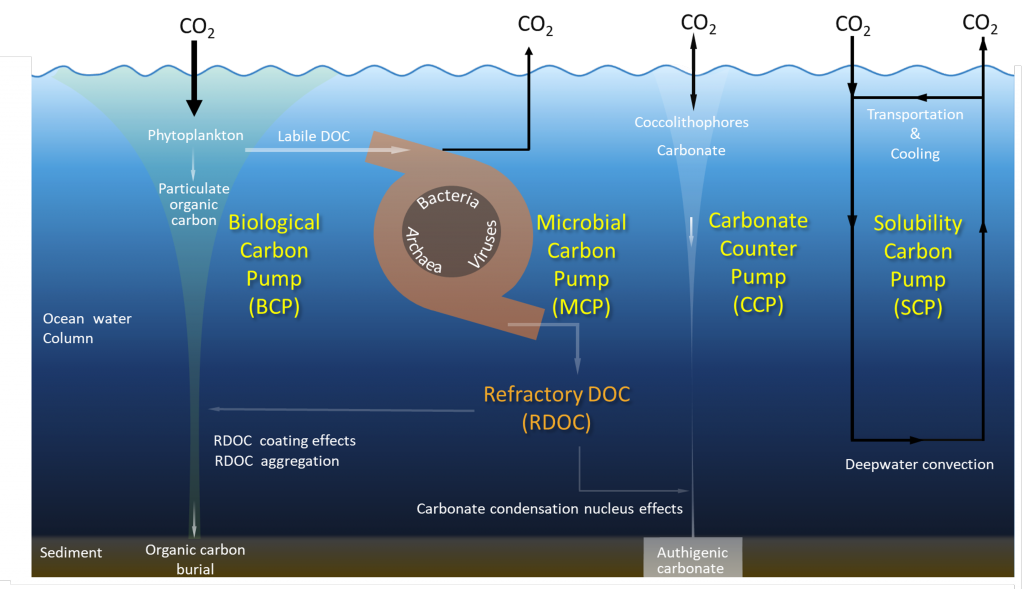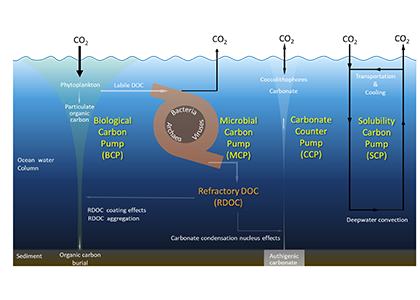How does the microbial carbon pump (MCP) redefine our understanding of oceanic carbon sequestration and climate change mitigation?
A recent study published in Nature Reviews Microbiology reviews the pivotal role of the microbial carbon pump (MCP) a novel concept differing from the known mechanisms for carbon sequestration in the ocean, the Biological Carbon Pump (BCP), the Carbonate Counter Pump (CCP), and the Solubility Carbon Pump (SCP) (Figure 1).

Figure 1 Illustration of the microbial carbon pump (MCP) and other carbon pumps, outlining their relationships and modes of carbon transformation and sequestration in the ocean.
Unlike the others, the MCP operates independently of physical processes like vertical transportation and sedimentation; it is driven by microbial processes at every depth in the water column, and functions as a two-way pump of carbon cycle, thus playing a unique role in regulation of climate change. The MCP’s role in transforming dissolved organic carbon (DOC) from labile states into refractory states, reveals the “enigma” of how the oceanic refractory DOC (RDOC) reservoir is formed. This paper also illustrates the dual functions of the MCP-regulated oceanic carbon reservoir over geological timescales, which may help explain the “eccentricity puzzle” in the Milankovitch climate theory.
The spatial and temporal distribution of RDOC is influenced by various microbial processes and the paper details how the MCP responds to environmental changes across environmental gradients and the entire water column. We also revealed the impacts of climate change on microbial activities and carbon sequestration efficiency, which in turn affect carbon cycles across different oceanic regions and depths. We explored the synergistic effects of the MCP with BCP, CCP, and SCP (BCMS), which could have great potentials in geoengineering. Applications of BCMS approach make it possible for international program on Ocean Negative Carbon Emissions (ONCE) practice for both of carbon sink enhancement and ecosystem sustainable development, such as scenarios of sea-farming areas and wastewater treatment plants, avoiding the potential risks of traditional geoengineering approaches.
Understanding the MCP processes and effects is essential for accurate assessment of the ocean’s capacity to mitigate climate change, and how the MCP can support potential modes of geoengineering. The findings and implications are of profound reference for policymakers, environmental stakeholders, and funding agencies for strategies to fight climate changes, leverage more effective preservation and restoration of ecosystems.
Authors:
Nianzhi Jiao (Xiamen University)
Tingwei Luo (Xiamen University)
Quanrui Chen (Xiamen University)
Zhao Zhao (Xiamen University)
Xilin Xiao (Xiamen University)
Jihua Liu (Shandong University)
Zhimin Jian (Tongji University)
Shucheng Xie (China University of Geosciences)
Helmuth Thomas (Helmholtz-Zentrum Hereon)
Gerhard J. Herndl (University of Vienna)
Ronald Benner (University of South Carolina)
Micheal Gonsior (University of Maryland)
Feng Chen (University of Maryland)
Wei-Jun Cai (University of Delaware)
Carol Robinson (University of East Anglia)




